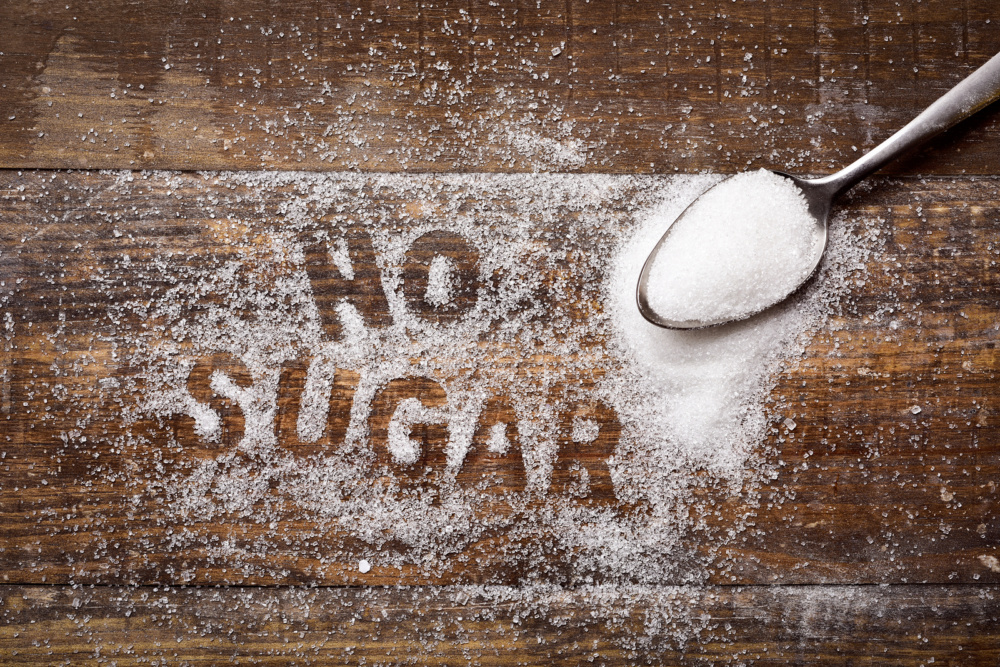By Christina Grenga
Perhaps you want to lose weight, and sugar cravings are sabotaging your efforts. Or maybe you want more energy, and know that getting off the blood sugar roller coaster is the key. It could be that you are done with the mood swings caused by eating sugar.
Kicking the sugar habit will dramatically improve your health, but it might seem like one of the most difficult things you have ever done. This isn’t surprising, given that sugar is so commonly available, providing temptation within so many of the foods we eat. The good news is, there are many ways to reduce sugar in your diet without feeling deprived. Understanding the reasons behind your cravings is half the battle to unlocking the solution that works for you.
It is important to realize that sugar is an addictive substance – just like caffeine and even alcohol. Sugar is an addictive substance because eating even a small amount creates a desire for more, and suddenly quitting causes withdrawal symptoms such as headaches, mood swings, cravings and fatigue.
Knowing this, don’t blame yourself for being “weak” and giving up if you fall off the wagon. It’s not just about willpower – your cravings have a physiological effect. However, it is possible to wean off sugar by reducing your intake gradually and painlessly.
Have a Clear Intention and Goal – Having a clear intention and goal in mind will help you to get off the sugar wagon, and to stay off. Visualize what your life will be when you are no longer under the control of your sugar dependency. Is your goal to lose weight, have more energy, better concentration and fewer mood swings? What will these benefits allow you to do? Ask the bigger “why”, until you get to what really moves you.
Also take stock of your obstacles. Journal about your challenges, and see what is really holding you back. Get to the bottom of it. It is time to stop hiding behind your excuses and take action to live your life to the fullest.
Use God as your driving force to give you the strength in achieving your goal of being healthier. Try to find a quiet space where you can share these thoughts with God, even if for just a few minutes each day.
Cultivate Awareness by Journaling – The first step to making changes is to be aware of the problem. Cultivate awareness and keep a food journal to observe how you feel after eating certain foods – record how your digestive system reacts, how your energy level feels for the next few hours, as well as how your mood and concentration are being affected.
For 2-3 days, tune into the impact of sugar on your overall well being, including your physical wellness, your mental clarity and your emotional balance. Notice what happens when you eat a lot of sugar – do you feel hyper and then crash quickly? Do you get moody or cranky? Do you crave more sugar even though you know you shouldn’t be eating it, and then feel guilty afterwards?
This mindfulness will help you build the awareness you need to bring about changes. This is the chance for you to get a handle on what you eat and drink, so that you can take control of how you think and feel.
Know Thy Enemy – Humans love sweet things – that is in our nature. Even before mankind started refining sugar, our ancestors sought out foods with sweet tastes. Our body is programed to desire sweet taste because sugar and carbohydrates provide energy that our bodies need for our day-to-day activities. Sweet foods contain a high concentration of sugar, which means a lot of easily accessible energy that makes sugar attractive.
It is important to remember that God will not allow you to be tempted beyond your ability and he will also provide a way of escape so that you will be able to endure it (1 Corinthians 10:13).
Curb Sugar Cravings with Food – Armed with this knowledge, you can reduce your sugar cravings by eating foods such as: grains, fish, sea vegetables, beans, root and sweet vegetables, nuts, seeds, leafy greens and winter squash. These foods help to create balance by satisfying the body’s needs without relying on sugar-laden foods to meet your energy needs.
They are also very grounding in nature. Include them in your meals, and see if they help reduce your urge for desserts. Also, be cautious about having a low protein intake, as this can mask itself as a sugar craving. If you have a relatively low protein diet and tend to feel fatigue easily, try increasing your protein intake, or experiment with the type of protein in your diet. Besides meat and fish, you can try nuts and seeds, good quality cheese in moderate amount, as well as eggs, and beans.
Sugar cravings can also be our body’s way of telling us that we need certain nutrients, besides protein. These nutrients include chromium, carbon, phosphorus, sulphur, and the amino acid tryptophan.
You can also use herbs and spices to help control your cravings. Coriander, nutmeg, cloves and cardamom naturally sweeten your foods. Cinnamon helps regulate blood sugar level, and also brings out the sweet flavor in foods. Use them to help curb your sugar cravings by satisfying your need for sweet taste.
Maintain Energy Naturally – Since the need for quick energy is a major reason people to reach for sugar, it is important to make changes to your lifestyle in order to boost your energy, so this doesn’t happen.
Stress can be a big reason for sugar addiction. The stress hormones exacerbate sugar cravings because sugars and sweets stimulate our brain to create feel-good chemicals. If you find yourself under stress and reaching for sweets, literally take a step back from the cookie jar, take a few deep breaths, get some oxygen into your brain and get in touch with the reason for your cravings.
This would be a good time to have a conversation with God to confirm your need for self-control, which he gave to all of us.
Prevent Dehydration – Often, when we crave sugar, it is our body being thirsty, not hungry. Most people are chronically dehydrated, or under-hydrated. Symptoms of dehydration include migraines, headaches, tiredness and digestive problems.
In particular, when you feel tired or have a headache due to dehydration, you will want a quick fix – and that most likely means you will reach for sugary foods. Next time you feel an urge to get sugary food, try drinking a glass of water, then give yourself a few minutes and see what happens.
Follow the 90/10 Rule – Finally, follow the 90/10 rule. Eat well and healthy 90% of the time, and let yourself indulge without guilt 10% of the time. Don’t beat yourself up if you slip – this kind of guilt does not help you stay on track.
As stated in the Galatians (5:22-23), “The fruit of the spirit is love, joy, peace, patience, kindness, goodness, faithfulness, gentleness and self-control.” God has designed our spirits to achieve these goals. Therefore, deprivation is not a sustainable way to make changes that last; it is faith that can heal your body and spirit. You may be able to go cold turkey on your favorite food for two weeks, but what happens after that? Most people will probably binge, feel bad, and give up.
Allowing yourself to eat what you love, and possibly finding healthier substitutes to satisfy your taste buds, is how you can make healthy changes that will bring you benefits for a long time to come.
Christina Grenga is a faith-based Certified Holistic Health Coach who works with modern Christian women who are ready to quit dieting for good, lose weight naturally, and transform their lives. She graduated from the world renowned Institute for Integrative Nutrition in New York City, and uses a Christ-centered approach to guide women in creating a balanced life. You can learn more about Christina at www.grengahealth.com







Recent Comments